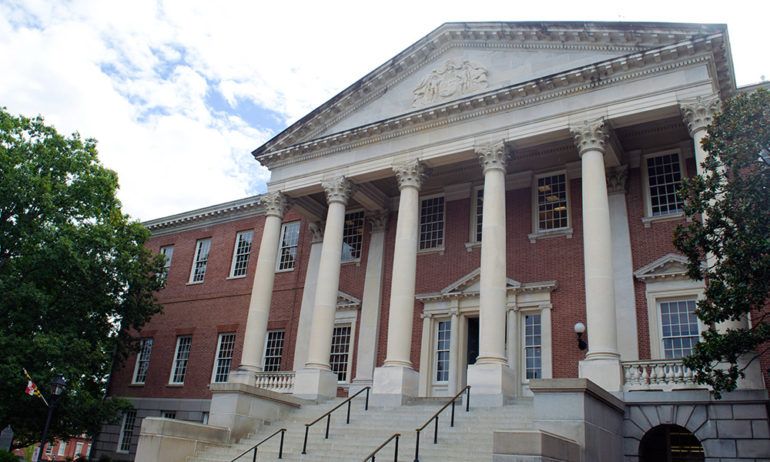ANNAPOLIS, Maryland — In a move to bring more transparency to the state government, the Hogan administration has proposed legislation, Senate bill 295, that will require all sessions of the Maryland General Assembly — including floor sessions, voting sessions and hearings — to be livestreamed to the public. Maryland is one of seven states that doesn’t have audio or video of what’s happening on the floor, according to the governor’s office. The bill was heard by a Senate committee on Tuesday.
Tax bill would alter personal exemptions
A bill altering personal exemptions passed unanimously in the Senate on Tuesday. The legislation, Senate bill 184, clarifies that a taxpayer can deduct personal exemptions for themselves, their spouse and eligible dependents for state income tax purposes. Prior to 2018, taxpayers were able to write off personal exemptions but the value was indexed for inflation and reduced or eliminated if the taxpayer’s federal adjusted gross income exceeded a certain dollar amount.
Slavery-era insurance provision addressed
A bill repealing provisions of laws that would require insurers to provide the Maryland Insurance Commissioner with information regarding slavery-era insurance policies advanced in the House of Delegates on Tuesday.
Delegate Mary Washington, D-Baltimore, is sponsoring the legislation, House bill 189, which cuts provisions that authorized insurers in the state to submit information related to slaveholder insurance policies to the Maryland Insurance Administration, which could then compile and report that information.
The current law consists of a policy issuing or benefitting a slaveholder that insured against a slave’s injury or death. Insurers then had to submit information about the policy, but the proposed legislation repeals the “obsolete” provisions.
Hogan bill addresses repeat drunken driving
The Hogan administration is cracking down on repeat drunk-driving offenders with a bill scheduled to be heard in a Senate committee on Tuesday. Senate bill 296 increases the penalties for a person who is convicted of driving under the influence of alcohol and/or drugs and either has three or more prior convictions or was previously convicted of a specified homicide, manslaughter, or life-threatening injury by motor vehicle. Violators would be given a felony charge and could be subject to imprisonment for up to 10 years and/or a fine of up to $10,000 — up from a maximum of 4 years of imprisonment and/or fine of $4,000.
Legislation bans passenger-seat marijuana smoking
A bill that would prohibit both the driver and passengers of a motor vehicle from smoking or consuming marijuana in the passenger area of a motor vehicle on a highway was scheduled to be heard on Tuesday by a Senate committee. Sponsored by Sen. Robert Cassilly, R-Harford, Senate bill 345 would make the offense a misdemeanor and the existing public marijuana use and possession penalty of a maximum fine of $500 will apply.
Learner’s permit time may be shortened
Sen. Bobby Zirkin, D-Baltimore County, is sponsoring legislation, Senate bill 424, that reduces the period of time by six months during which certain adults younger than age 25 who hold a learner’s permit must wait before taking a drivers test for a provisional license. Young drivers must wait nine months before getting a license under current legislation. Instructional permit holders convicted of, or granted probation for, a moving violation are not eligible.
Hunting in neon pink could become law
A Maryland lawmaker is advocating for the authorization of “daylight fluorescent pink” as a color for certain outerwear hunters must wear. Sen. Adelaide Eckardt, R-Caroline, Dorchester, Talbot and Wicomico, has drafted Senate bill 341 that would allow hunters to wear specified pink clothing, or wear daylight fluorescent orange clothing. Daylight fluorescent pink has been authorized in six states. The bill was heard in a Senate committee on Tuesday.
Bills address organ donation
Two measures related to organ donation are under consideration in the General Assembly. A bill heard on Tuesday by a Senate committee would authorize the Motor Vehicle Administration to designate a vehicle used to transport organs as an emergency vehicle if it meets certain requirements. Under Senate bill 475, sponsored by Delegate Thomas Middleton, D-Charles, these vehicles would be equipped with lights or signal devices and all drivers will be required to complete a course approved by the Maryland Fire and Rescue Institute. And on Tuesday morning, House Speaker Mike Busch, D-Anne Arundel, honored the University of Maryland Medical Center transplant team and his sister, who donated part of her liver to him last year. Busch is the sponsor of House bill 96, a tax measure that creates an income reduction for up to $7,500 of qualified expenses incurred by a living organ donor.
Motorcyclists could go helmet-free if bill passes
A bill heard on Tuesday in the Senate Judicial Proceedings committee could exempt some motorcycle riders from helmet requirements in Maryland. Any licensed motorcycle operator who has been riding for at least two years and has completed an approved motorcycle rider safety course, as well as their passengers, will be exempt from headgear. Senate bill 439 was sponsored by Sen. Wayne Norman, R-Harford and Cecil.
Bills would allow collective bargaining at college; crack down on hazing
Multiple Senate bills were on track to be heard in the House Appropriations committee on Tuesday regarding higher education, including collective bargaining rights to certain adjunct faculty (House bill 163) and graduate assistants (House bill 199) at certain public institutions of higher education; and written policy and educational programs on hazing (House bill 368).
–Capital News Service correspondent Sean Whooley contributed to this report.

